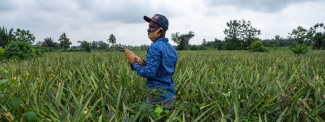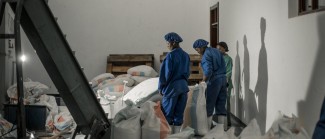A roundup of recent news on the global pandemic, covering issues facing some of the world’s poorest countries – and what they are doing
Trade for Development News is committed to keeping readers informed about the global crisis and its effect on people in the world’s poorest countries. The items below cover select least developed countries and regions, and perspectives from climate change to internet access with the most relevance for the world’s poor during this pandemic.
Bangladesh
Global demand for clothing has plummeted, and Bangladesh, the world’s second largest producer after China, is feeling the impact. CNN reports that garment orders worth US$3 billion are being cancelled or suspended, and that some factories are shifting production to personal protective equipment (PPE) for domestic use and for export.
Malawi
Last Friday, a High Court judge blocked a government plan to lock down the country for 21 days, Al Jazeera reports, with Malawi workers arguing that the move would have a terrible impact on their incomes.
Myanmar
COVID-19 is affecting Myanmar, even with few cases of the virus reported there. The land border is closed with China – as are imports – and the New York Times writes of factories shuttered due to reduced global demand for items like garments, shoes and bags. The Diplomat covers the economic challenges that will be tough for the small country to weather alone.
Nepal
The country has been in lockdown since 24 March, and still has few reported coronavirus cases. Foreign Policy looks at what the country is facing with an economy highly dependent on tourism and limitations on COVID-19 testing ability.
Somalia
Somalia’s number of coronavirus cases saw a stark increase since last week. With a large illiterate population and a country in conflict, it is a struggle to communicate and provide the necessary information. Kenya’s Daily Nation reports that the government has set aside US$5 million to combat the virus.
Africa
The Prime Minister of Ethiopia wrote in the Financial Times of the pandemic’s potential to destroy vulnerable economies in Africa and the difficulties with health systems and social distancing measures, arguing that the strategy to battle COVID-19 must be a global one.
Some countries in Africa have no ventilators at all. The New York Times reports that 10 countries have none, the Central African Republic has three for its five million people, and South Sudan, with a population of 11 million, has just four. And then there are the shortages of other basic supplies.
The African Continental Free Trade Area (AfCFTA) is slated to start in July, with a little over half the countries having ratified the agreement. This piece from Rwanda’s The New Times looks at what impact COVID-19 could have on the flagship African Union project, considering slowing growth and threats to millions of jobs on the continent.
Conflict
Forty-eight percent of poor people today live in conflict-affected or fragile countries. Drawing from efforts with such countries, the Overseas Development Institute (ODI) has this piece on learnings from that work, including from LDCs Uganda and Sierra Leone, and how that can inform COVID-19 responses.
Trade
WTO head Roberto Azevedo writes in Barron’s of the drastic decline in world trade, and that trade needs to be part of the COVID-19 response to ensure medical products and drugs flow across borders, and urging all governments to be transparent about trade policies.
Internet
With the move to digital-only engagement, it is important to remember that not everyone has such connectivity. This piece from the World Wide Web Foundation reminds that only 54% of the world’s population has access to the internet – and of those that don't, most are the world’s poor – arguing for urgent action to rectify this as part of the fight against COVID-19.
Aid and debt
Ian Goldin of Oxford University writes in The Guardian that COVID-19 is the biggest disaster for developing nations in our lifetime, with poorer people at greater risk of catching the virus, and of losing their livelihoods. He argues for a global Marshall plan to write off the debt of African countries, and for at least US$2.5 trillion in aid to go to poor countries.
If you would like to reuse any material published here, please let us know by sending an email to EIF Communications: eifcommunications@wto.org.



